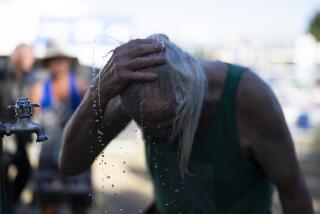Chilean Fruit Industry Halts Production to Allow Inspections
The Chilean fruit industry, stunned by a U.S. import ban, ordered a 72-hour halt to all packaging and shipping Tuesday to allow thorough inspections meant to reassure foreign markets that the products are safe to eat.
Bitter domestic political recriminations circulated on the day after the American announcement that traces of cyanide were found in two grapes in a shipment from Chile. The government described the case as “terrorism, backed by international communism.”
The banned Communist Party responded by accusing the government of raising a smoke screen to cover up its failure to devise adequate safeguards and to curb the widespread use of chemicals to increase crop output.
‘Small and Harmless’
Fruit growers, exporters and the National Agricultural Society said that the U.S. ban, which was adopted Tuesday by several other countries, did not appear to fit the crime--the discovery of “small and harmless” traces of cyanide in the two grapes in a shipment to Philadelphia.
Nevertheless, the three organizations said Tuesday evening that they had ordered a halt to packing and shipping for three days because: “We want to show the world that this has been an isolated incident, which cannot happen again because of the strict measures taken.”
Turmoil engulfed the industry, which has been a principal engine of Chile’s explosive export growth in the 1980s. Revenues from exported fruit earned $584 million in 1988, up from $285 million in 1984, and some officials warned of potential losses of hundreds of millions of dollars if the foreign bans on Chilean fruit remain in force.
Table grapes account for more than half of Chile’s total fruit exports, followed by apples, pears and nectarines. Chile’s location in the Southern Hemisphere, where the seasons are reversed, gives its fruit crops a natural market in the United States, Europe and Northern Asia, making up the majority of some American fruit stocks at this time of year.
The tainted grapes were found in inspections prompted by anonymous phone calls to the U.S. Embassy in Santiago.
No one could explain who might benefit from sabotaging the industry at a time when Chile has recently voted down a new term for President Augusto Pinochet in a plebiscite and is headed for democratic elections in December for the first time in 19 years. The Communist Party has tacitly approved of the elections.
Agriculture Minister Jaime de la Sotta flew to Washington on Tuesday night to explain Chile’s new safeguards to U.S. officials.
Speaking to reporters between consultations with industry leaders, De la Sotta reiterated the government’s view that the contamination involved “a terrorist act.” He added: “We have information that terrorists have infiltrated fruit-packing plants.” He did not elaborate.
De la Sotta also complained that the consequences of two contaminated grapes have been disproportionate.
“I don’t think an anonymous phone call and two grapes should be allowed to endanger the entire world’s trade system,” he said.
He acknowledged that the government had determined which plant the tainted grapes came from and had begun an investigation. He would not identify the plant.
But the president of the fruit exporters, Enrique Bruzzone, said the grapes came from a vineyard and packing house owned by an established and respected grower, Julia Saavedra, in the Curacavi area, between Santiago and the coastal city of Valparaiso.
Jose Sanfuentes, a spokesman for the Communist Party, said: “In his desperation, Pinochet is seeking any maneuver he can come up with to impede the effects of his defeat (in October), and one of those means is the Communist Party. He is not only attacking the Communists but all of the opposition.”
Patricio Aylwin, the Christian Democratic Party’s president and likely candidate in the December vote, said the poisoning might be the work of terrorists, or of a business competitor attempting to damage the firm that handled the tainted grapes, or “an act of a man who has lost his mind. . . . The government should not shoot into the sky blindly, which does not seem fair to me.”
Raimundo Correa, vice president of the Federation of Fruit Producers, said the ban, if retained through the rest of Chile’s harvest season, would ultimately affect all 350,000 workers in the fruit industry. That includes 11,000 growers and about 1,100 packing plants.
Correa said the psychological impact could affect the fruit market worldwide and could cost Chileans up to $850 million in losses, including the impact on growers, shippers, field workers and related industries.
The United States receives about half of Chile’s fresh fruit exports, with 30% going to Europe, and Japan now beginning to show keen interest in increasing its small imports, Correa said.
Now, however, Japan, Hong Kong, Denmark and the German port of Hamburg announced they were joining the United States and Canada in banning Chilean fruit.
Hugo Artega, leader of a group of Christian Democratic agronomists, said the crisis revealed the overemphasis that Chile has placed on “a few products and a few markets.” He said the hardest-hit sector would be the fruit pickers, who work seasonally and are paid by the case.
In the Central Valley south of Santiago, a main fruit-growing district, farmers and fruit processing company executives were flabbergasted by the U.S. action.
“Some people think the worst--that this will kill our businesses for five years,” said Jose Miguel Pereira, one of three owners of Fruto del Maipo, a fruit freezing and packing company. Like many in the valley, he arrived in the late 1970s, sensing that fruit exports had a strong future.
Located in the town of Buin, about 30 miles south of Santiago, his business has mushroomed since its start in 1978. The company now has more than 600 employees in two modern plants near the Pan American Highway. Fruit cultivation in Buin, he said, has grown from 1,500 to 6,000 hectares in the last 15 years.
All along the highway, there is evidence of the boom. Along with vineyards, apple orchards, sunflower fields and corn fields are the subsidiary industries that live off fruit exports. Nurseries line the road, offering fruit plant seedlings, and agricultural hardware and tractor shops abound. The new processing plants are Spartan, in metal-warehouse style, but still among the newest and most modern in Latin America.
Pereira said he hoped losses could be contained by prompt and thorough government action, and understanding by American consumers. He pointed to a tidy laboratory in his plant where a crew of several technicians in white lab coats carry out inspections of the produce as a sign of the sophistication of Chile’s fruit industry.
A few miles farther south, in the town of Paine, 18-year-old Emilia Juana Riqualme and a friend said they had gone to their grape-picking job in the morning, only to be told there would be no harvesting. They were told to come back Friday, to see if work can resume then, she said.
“Today the people are very upset,” Riqualme said.
More to Read
Start your day right
Sign up for Essential California for news, features and recommendations from the L.A. Times and beyond in your inbox six days a week.
You may occasionally receive promotional content from the Los Angeles Times.






